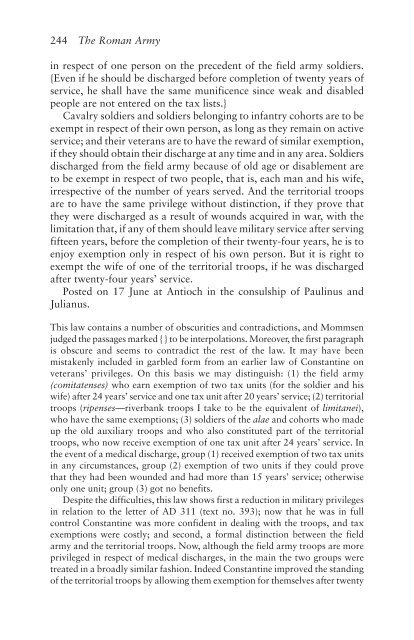The Roman Army, 31 BC–AD 337: A Sourcebook
The Roman Army, 31 BC–AD 337: A Sourcebook
The Roman Army, 31 BC–AD 337: A Sourcebook
You also want an ePaper? Increase the reach of your titles
YUMPU automatically turns print PDFs into web optimized ePapers that Google loves.
244 <strong>The</strong> <strong>Roman</strong> <strong>Army</strong><br />
in respect of one person on the precedent of the field army soldiers.<br />
{Even if he should be discharged before completion of twenty years of<br />
service, he shall have the same munificence since weak and disabled<br />
people are not entered on the tax lists.}<br />
Cavalry soldiers and soldiers belonging to infantry cohorts are to be<br />
exempt in respect of their own person, as long as they remain on active<br />
service; and their veterans are to have the reward of similar exemption,<br />
if they should obtain their discharge at any time and in any area. Soldiers<br />
discharged from the field army because of old age or disablement are<br />
to be exempt in respect of two people, that is, each man and his wife,<br />
irrespective of the number of years served. And the territorial troops<br />
are to have the same privilege without distinction, if they prove that<br />
they were discharged as a result of wounds acquired in war, with the<br />
limitation that, if any of them should leave military service after serving<br />
fifteen years, before the completion of their twenty-four years, he is to<br />
enjoy exemption only in respect of his own person. But it is right to<br />
exempt the wife of one of the territorial troops, if he was discharged<br />
after twenty-four years’ service.<br />
Posted on 17 June at Antioch in the consulship of Paulinus and<br />
Julianus.<br />
This law contains a number of obscurities and contradictions, and Mommsen<br />
judged the passages marked { } to be interpolations. Moreover, the first paragraph<br />
is obscure and seems to contradict the rest of the law. It may have been<br />
mistakenly included in garbled form from an earlier law of Constantine on<br />
veterans’ privileges. On this basis we may distinguish: (1) the field army<br />
(comitatenses) who earn exemption of two tax units (for the soldier and his<br />
wife) after 24 years’ service and one tax unit after 20 years’ service; (2) territorial<br />
troops (ripenses—riverbank troops I take to be the equivalent of limitanei),<br />
who have the same exemptions; (3) soldiers of the alae and cohorts who made<br />
up the old auxiliary troops and who also constituted part of the territorial<br />
troops, who now receive exemption of one tax unit after 24 years’ service. In<br />
the event of a medical discharge, group (1) received exemption of two tax units<br />
in any circumstances, group (2) exemption of two units if they could prove<br />
that they had been wounded and had more than 15 years’ service; otherwise<br />
only one unit; group (3) got no benefits.<br />
Despite the difficulties, this law shows first a reduction in military privileges<br />
in relation to the letter of AD <strong>31</strong>1 (text no. 393); now that he was in full<br />
control Constantine was more confident in dealing with the troops, and tax<br />
exemptions were costly; and second, a formal distinction between the field<br />
army and the territorial troops. Now, although the field army troops are more<br />
privileged in respect of medical discharges, in the main the two groups were<br />
treated in a broadly similar fashion. Indeed Constantine improved the standing<br />
of the territorial troops by allowing them exemption for themselves after twenty



